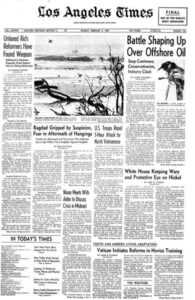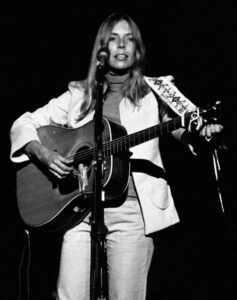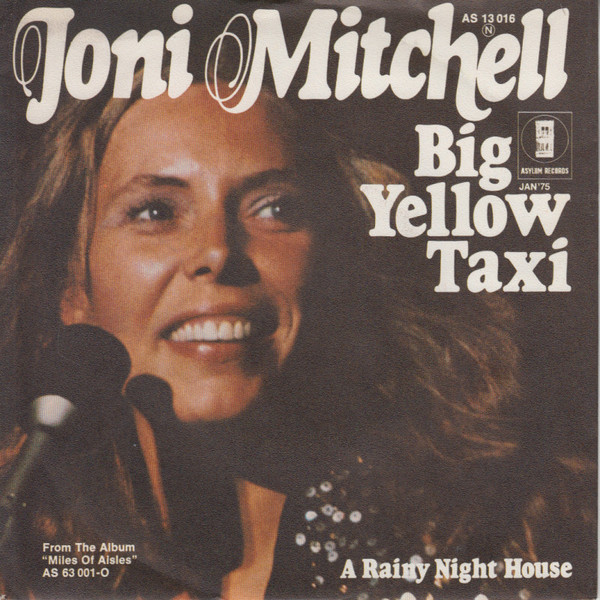“Big Yellow Taxi” is a protest song for environmental change, written and sung by Joni Mitchell. This song has left a legacy of reflection about environmental justice and change. According to the Canadian Songwriters Hall of Fame, Big Yellow Taxi has since been covered and sampled by other famous artists who have taken up this song to promote their social justice issues. Written and released at the beginning of the 1970s, during an era of activism and protest it’s no surprise that Mitchell was able to garner inspiration. “Big Yellow Taxi” was created during a year, according to Charles Morris, “…[that] produced a stream of environmental protest songs, all of which have proved sustainable.” Morris then goes on to explain that this song’s “sustainability” is attributed to environmental disasters happening during that time along with the environmental activism we still see today, leaving the song timeless. While “Big Yellow Taxi” was inspired by Mitchell’s eye-opening trip to Hawaii, the song applied to the masses who were experiencing heavy losses in nature. In 1969, the Santa Barbara oil spill happened, which was one of the worst oil spills in America (so bad that it inspired the First Earth Day). As Charles Leonard wrote in his article, “There were specific reasons for environmental angst at the time,” which Mitchell was able to channel into her song to help promote awareness for appreciating a quickly disappearing nature.
Morris then goes on to explain that this song’s “sustainability” is attributed to environmental disasters happening during that time along with the environmental activism we still see today, leaving the song timeless. While “Big Yellow Taxi” was inspired by Mitchell’s eye-opening trip to Hawaii, the song applied to the masses who were experiencing heavy losses in nature. In 1969, the Santa Barbara oil spill happened, which was one of the worst oil spills in America (so bad that it inspired the First Earth Day). As Charles Leonard wrote in his article, “There were specific reasons for environmental angst at the time,” which Mitchell was able to channel into her song to help promote awareness for appreciating a quickly disappearing nature.
 While enjoying her time on her trip she noticed that in the center of her idyllic and picturesque view of Hawaii from her hotel, a parking lot slashed through this view. Providing a painful wake-up call to protect nature, which has been taken for granted and chopped up by consumerism and inattentiveness. Her song provides a “mixing genres” that may be implicitly combining the natural with artificial while trying to communicate to people the sad reality of where things are going (Rosenthal and Flacks 57). Mitchell also incorporates a catchy hook which almost feels like a call and response, or an invitation to sing and think about the message of a paradise being lost. The genre of Folk-Rock mixed with Pop, the Folk aspect of this song brings about a togetherness aspect the song. As Rosenthal and Flacks generalized about folk music it means, “personal and ‘authentic’” (Rosenthal and Flacks 52). While rock “…carried with it that sense of rebellion” (Rosenthal and Flacks 55). The Folk-Rock mixed with pop points to a modern community with a reminder about how personal taking nature for granted can be in terms of consequences.
While enjoying her time on her trip she noticed that in the center of her idyllic and picturesque view of Hawaii from her hotel, a parking lot slashed through this view. Providing a painful wake-up call to protect nature, which has been taken for granted and chopped up by consumerism and inattentiveness. Her song provides a “mixing genres” that may be implicitly combining the natural with artificial while trying to communicate to people the sad reality of where things are going (Rosenthal and Flacks 57). Mitchell also incorporates a catchy hook which almost feels like a call and response, or an invitation to sing and think about the message of a paradise being lost. The genre of Folk-Rock mixed with Pop, the Folk aspect of this song brings about a togetherness aspect the song. As Rosenthal and Flacks generalized about folk music it means, “personal and ‘authentic’” (Rosenthal and Flacks 52). While rock “…carried with it that sense of rebellion” (Rosenthal and Flacks 55). The Folk-Rock mixed with pop points to a modern community with a reminder about how personal taking nature for granted can be in terms of consequences.
 Joni Mitchell’s, “Big Yellow Taxi” is a song that calls for environmental awareness and a need to change through its genre, lyrics, and historical context. By overtly explaining the diminishing nature spots left for us to enjoy and how we’ve taken it all for granted, Mitchell allows us the space to mourn what has been lost due to our collective carelessness with nature. Her song’s solution is not explicitly said, but it encourages us to protect our “paradise” before it is all truly lost. The song makes us reflect on how we feel, it asks, “does this imagery make us feel mournful? Can we make a change so we don’t have to feel like we’ve lost any more paradise? Are we willing to stop commercializing nature for short-term gains and think about the long-term consequences?”
Joni Mitchell’s, “Big Yellow Taxi” is a song that calls for environmental awareness and a need to change through its genre, lyrics, and historical context. By overtly explaining the diminishing nature spots left for us to enjoy and how we’ve taken it all for granted, Mitchell allows us the space to mourn what has been lost due to our collective carelessness with nature. Her song’s solution is not explicitly said, but it encourages us to protect our “paradise” before it is all truly lost. The song makes us reflect on how we feel, it asks, “does this imagery make us feel mournful? Can we make a change so we don’t have to feel like we’ve lost any more paradise? Are we willing to stop commercializing nature for short-term gains and think about the long-term consequences?”

October 2, 2022 at 8:07 am
Arianna,
A truly wonderful post. I like how you move from subject to subject, using the sources (so great that Mitchell has them on her web site!) and images enhance your discussion. Where did you get the LA Times screenshot?
Looking forward to seeing what you can do with this song!
Bill